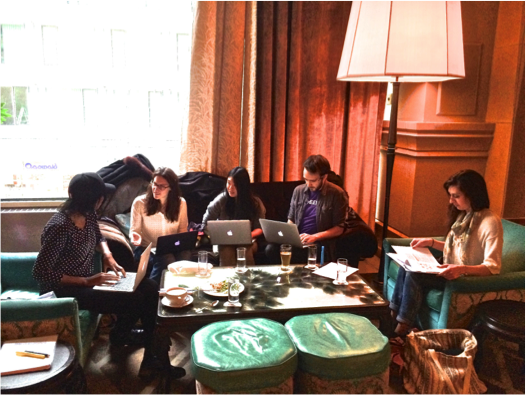
No Water, No Time, No Problem
No water, no time, no problem.
In the last few months the company has prioritized a few initiatives: 1) create a culture committee to make the work environment even more enjoyable; 2) create a technology committee to stay abreast of all things new and tech; and 3) prioritize sharing our research (more on the first two initiatives later). But, how do you find time to write more when you’re already swamped with projects? Here’s what we tried.
We started with a handful of MCG employees and began identifying projects that we thought were important to share, but that didn’t require “re-inventing the wheel.” We put out an internal call for collaborators and asked the newly created publication committee to find resources and materials that could prove beneficial to the group. Time was still a challenge, so we decided the best way to make traction was to set aside a chunk of time on a regular basis. Fast forward to our first inaugural “Writer’s Block – a 4-hour Saturday afternoon session dedicated exclusively to writing.
We planned to hold a potluck in the company conference room for our first “Writers Block”, but after a last-minute street-wide water shut-off, we took to the SoHo Grand down the street (lesson: be flexible!). In just four hours, we submitted two conference sessions, outlined two papers, and laid out how to recruit a control group for a previous study to bolster the findings. It’s a start, but we’ve got a lot of work to do!
How can you start your own writing/publication initiative? There are a variety of personal and professional reasons we were and are willing to spend extra time at work. But, a good work climate makes it that much easier to suggest spending your free time working. This reminds me of my elementary school principal. He could take kids who didn’t want to go to school and would get them to willingly arrive a half hour early. How? Take on a writing project if the topic or goal is personally meaningful. A “group” can be any size – coworker, friend, or colleague – to offer encouragement and support. At the very least, share your goals loud and clear. This will increase the odds that you do what you say you will. Just because you are at work does not mean you have to abandon the tried and true study group you had in college. There were a number of reasons you met as a group – motivation, sharing the workload, learning from one another and, of course, increased accountability.
As researchers, especially applied researchers, it’s important to disseminate our findings. In our group, no two writing projects are the same. We have undergraduate literature reviews, a dissertation, poster presentations, abstract submissions and an academic journal. It’s good for the company and it’s good for your career. A line of work will showcase what your company’s capabilities and will allow you to find a personal expert niche (see Ten Tips for Developing a Programmatic Line).
How to start your own writing initiative (company or personal):
- An initiative is no good unless you stick to it. Find out what is really important for you and your company, and identify people who can keep it moving forward.
- Identify the people who can dedicate the time and can stick to the deadlines. Those who are knee-deep in an evaluation or project will be stretched too thin. They can join in a few months time.
- Allot time to write. No one will ever just find the time to write. It has to be a priority.
- Get permission early. How much you are able to share depends on the agreement with the client. You don’t want to put all the work in to find out that there are proprietary or ND agreements.
- Talk about writing credit early on. Some people may have made big contributions on the implementing the study or writing up the results but not have the time to write the manuscript. Others may no longer be at the company. Decide who gets first, second, third authorship – the sooner the better, to avoid uncomfortable conversations later!
- Pick a place to publish. Publications can take many forms – academic journals, popular media outlets, blog posts, conference posters and symposium. Brainstorm what research has not been shared and the most appropriate venue. From there you can identify natural deadlines and work backwards.
- Decide each person’s role and be accountable. Create deadlines and goals and stick to them. A paper shouldn’t take years to publish. Decide what you want/can be done by the holidays, by the spring, etc.
- Switch up the venues and the times. Try the CubeFree app for finding places in your neighborhood other than the office. If you want to stay in the office, bring snacks and choose a common area. We will alternate weekend blocks with early morning blocks. Decide what’s the best fit four your group. We choose to meet in person, but you may consider something remote via skype or gotomeeting.
- Reserve writing blocks for writing. Have most of your brainstorming/idea generation done beforehand. Have a clear idea of what you want to get accomplished during this set aside time.
- Think about publication from the outset of every study. There should be a clear plan of how and where the reports will be shared, in what form, and who will be responsible for allocating the resources needed to publish.
Suggested Reading:
- Write it Up. Practical Strategies for Writing and Publishing Journal Articles by Paul J. Silvia, PhD
- Publishing Journal Articles by Lucinda Becker and Pam Denicolo
- Time Management Lessons from People who Write a Novel in a Month in Fast Company http://www.fastcompany.com/3038045/7-time-management-lessons-from-people-who-write-a-novel-in-a-month





 Your message was successfully sent. Thank You!
Your message was successfully sent. Thank You!